It is that day of the year when India celebrates Raksha Bandhan or Rakhi. It is also that time of the year when a campaign is at its peak. In which they the feminists tell us about how Rakhi is demeaning for us women.
Since the noise is about how the festival of Rakhi is but a symbol of ‘patriarchal’ ‘Hindu’ ‘culture’; and since these ‘anti Raksha Bandhan’ campaigns are limited to internet and the urban janta, I am limiting my arguments to just that. Is the festival really demeaning for us women?
To tell the truth I have gone through this exercise of ‘why would I need a man to protect me?’ The exercise has also strongly reminded me of how harmless the coloured threads of Rakhi were. And I have also realized that our culture and practices have evolved over the years.
The history of this nation is a pretty old one. Culture and festivals had progressed and over time we started discarding the darker parts of our culture. Raksha Bandhan as I saw it was a celebration of the bond between brother and sister. And that is how most of us who celebrate the festival see it today. When I or many from my gender plan for the big day, we do not expect our brothers to fight the world for us. The colourful threads with intricate patterns that adorn the wrists are not seen as insurance to get protective gear on our bodies.
The feminists see red in Rakhi. The feminists see patriarchy in Rakhi. But they do not see the love that is wrapped in those little pieces of thread. What patriarchy is there in the regular tale of a brother who probably doesn’t eat his favourite sweet or walks back home every day so that he could just save a little bit extra from his pocket money to buy a gift for his sister on Rakhi? What patriarchy is there when a sister takes an extra student in her tuition so that she could throw a party for her brother on Rakhi?
And the ‘protection’ that the liberal minds look at as ‘filthy’ is not as filthy. A sister stands up for a brother and takes on colony or school bullies singlehandedly not as a token protest against patriarchy. The brother who injures himself while saving his sister from eve teasers doesn’t have patriarchy in mind when he takes the sharp edge of a beer bottle on his stomach. If a brother fights for a sister it becomes patriarchy? And when a woman stands up for another woman, she becomes a brave heart? What equality are we talking about?
Every time we talk about how synonymous family ties and Indian culture is, we have catcalls of ‘but rapes happen within families’. Or the newest one is ‘I will not tie a Rakhi unless men stop molesting women’. Seriously? By what logic would we generically blame the family structure or the festival of Rakhi for a crime committed by a random someone?
Then there is the accusation that pressure from parents makes young girls tag men with a ‘Bhaiyya’ and a ‘Rakhi’. This is a vast generalization. They do not see a young boy who looks at the festival with moist eyes because he has no one who would tie him a Rakhi. They do not see a young girl who prays to God to ‘gift’ a brother because she has none. I remember having at least two close buddies who did not have sisters. The tradition of Rakhi had started almost by request. And not because I, or my family saw threatening potential suitors in the two young men.
An unbiased study would look at patriarchy and its evils but not associate every cultural celebration with it. To malign an entire festival is to belittle a timeless bond of brother sister love. Isn’t the feminists movement all about personal choice? Why then the vitriol whenever Rakhi (or any Hindu festival) is round the corner?
This is not the era of battles. This is also not Swargalok. Nor is this the era of epics. Raksha Bandhan has evolved into a sweet festival of sibling bonding. However if anyone is irked with it as it is essentially a Hindu festival, they can do a quick history check. As they are unable to read the symbolism behind Draupadi and Krishna’s story or even Yamuna and Yama’s story they can take up Karnavati and Humayun’s story. That would make the festival ‘secular’ and thereby saving the ‘idea of India’. A Mughal ruler extending protection to a widowed Rajput Queen would also let the festival become less ‘patriarchal’ and more historically relevant.
